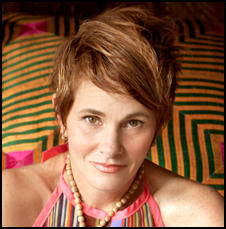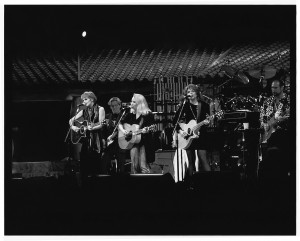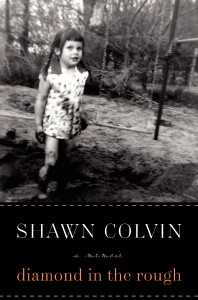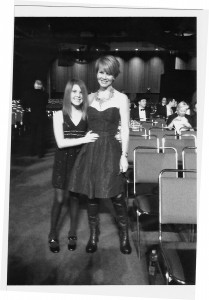August 2012 Profile: Shawn Colvin
 NAME: Shawn Colvin
NAME: Shawn Colvin
AGE: 56
RELATIONSHIP STATUS: Twice Divorced
RESIDENCE: Austin, Texas
CHILD’S NAME/AGE: Callie, 13
PROFESSION: Award-winning singer (Multiple Grammy Awards for Sunny Came Home), songwriter, musician, recording artist, performer, and author. Latest projects: ALL FALL DOWN (CD) and DIAMOND IN THE ROUGH (Memoir published by William Morrow). Visit http://www.ShawnColvin.com.
Q. Was it planned to publish the book and new CD at the same time? How does that feel?
A. Yes. It’s like I had twins!
Q. That’s a good lead in to my next question…..What does Callie think of your work? How do you balance spending time with her and your active career?
A. She thinks my work is cool if it gets her something. I think she’s proud of me. Although it’s a double-edged sword if her casual friends find out who I am and recognize me because of Sunny Came Home or something.
 For example, I sang with Taylor Swift not too long ago in Austin where we live, and Callie liked me that day. She got to meet Taylor and see the show.
For example, I sang with Taylor Swift not too long ago in Austin where we live, and Callie liked me that day. She got to meet Taylor and see the show.
As far as balancing, that’s a challenge every single day. I’m her mom. I don’t like to leave her. Sometimes it’s a relief. Sometimes I need a break. But you can’t control what happens when you’re away. And, if she’s having trouble of any kind, it’s torturous. I try not to be gone more than two weeks. In fact, two weeks is pretty lengthy for me.
Unfortunately, this year, because of the record and the book, I’m gone a lot. I keep in contact with her a lot. We have a pretty good rapport. She’s open with me and tells me a lot of stuff.
She stays with her father when I’m traveling.
Q. How is Callie since hitting her teens?
A. She thinks I’m kind-of an idiot, but that’s 13. She’s become a full-fledged teenager. It’s entertaining, but it’s sort of like regression. In an attempt to become independent, they come out with both guns blazing wanting to be an adult, except when they want something from you. It makes them a little insane. Their ability to understanding what’s dangerous and what isn’t goes out the window. They haven’t learned that yet. It’s kinda like you have to go back to when they were three and remind them not to cross the street by themselves.
And, they become more adept at becoming argumentative and manipulative. That’s very interesting. It’s a challenge, but it’s really delightful. She’s quite a girl. Very funny. Quite a character. Just full of life and vigor, and it’s energizing and inspiring to be around her.
 Q. What was your motivation for writing a memoir?
Q. What was your motivation for writing a memoir?
A. I kind of did it on a dare to tell you the truth. I would not have thought to write a book nor would I have thought myself capable of it. But, my manager said I think you have a story to tell. I said, be that as it may, I don’t know that I’m capable of writing a book, and I’m not sure who would want to read it. He said why don’t you start by writing a couple of chapters. I thought I could do that…that might be fun. And, then it was pitched by an agent, and I was picked up to write a book. So then I really had to come to terms with whether I was going to try, and I decided I would. It took about three years…not too bad.
Q. What was the writing process like for the book vs. your music?
A. It was very different. The book was a matter of really breaking things down. Understanding what the outline was and what I was trying to accomplish, and chipping away at it bit by bit but trying to have a larger picture in mind. A song is a three or four minute exercise. Not that it takes that time to write the song, but it’s a much shorter genre. You’re hemmed in in a good way by rhyme, melody, rhythm, title that probably repeats and chords that you probably repeat. It can be daunting as well. The blank page always is. But, I songwriting is easier for me for sure.
Q. Did you have a writing routine? Where do you create?
A. I didn’t sit down everyday. I had to do it in between touring and raising Callie. So, what I would do is take weeks here and there. I’d take a week, and I’d put it aside and maybe I’d go somewhere. I wrote some of the book in Nantucket…Mexico…and then I would also just go to my room a lot….for example, when Callie was in school…and just write…not particularly for the book. Just things that were going on. If you write something, it usually makes it to somewhere. I wrote a lot of it on my iPad, and I also work on a computer.
Writing it was a challenge. To actually go in myself and ask… How did this feel? How to you describe it? How did it start? Did it end or not end? How do you deal with it now? What’s the process? How did it affect other people? How is writing about it going to affect your daughter? I questioned a lot of things.
Q. Did you share it with people during the process?
A. I have a few friends who I trust…who would tell me the truth…and had written themselves. I’d read aloud to them or give them pieces. I was very unsure of myself a good deal of the time.
Q. How does it feel now that Diamond in the Rough is out?
A. Prior to it just coming out, I was pretty anxious. I felt like “what have I done?” It was like I’d taken my clothes off. It’s a revealing book. If there were things about friends I thought they might not want others to know, I’d change their name. I don’t have any problem being revealing, but this took it to another level. It puts you out there, but the response has been good, and because I talk about difficult things I’ve gone through like depression and anorexia, my hope was that in the telling of things, I would provide some help to other people. The best help and comfort I’ve gotten when I’ve gone through rough times was to know that I wasn’t alone. You have the love of your friends and family, but the people who have gone through what you’re going through I’ve found to be the most helpful and comforting.
 Q. Have you thought about Callie’s reaction to the book?
Q. Have you thought about Callie’s reaction to the book?
A. I imagine she’ll read it sooner than later because it will just be too tempting. I have to be prepared for that.
My intent is to walk her through it and be really involved in the fact that she’s reading it, so she can ask me question,s and we can share together. There are things I wish she’d wait to read, but I doubt that will happen. I’ve told her that, but I imagine her curiosity will get the best of her. She knows a lot about my life. I’m an open person, and genetically speaking, she is at risk. No one understood what my illness was. If she gets it, I want her to know I know what it looks like, and I can help her.
Q. Are you speaking about depression?
A. Yes
Q. How are you doing now with that?
A. I’m really getting quite well. It’s hard to find a really great doctor, but I did. I just can’t emphasize enough how important it is to find someone qualified…a psycho-pharmacologist….to treat depression…..it’s a science, and you want an expert. It takes some shopping around which is really hard to do when you’re depressed. But, I found someone really smart who also has a heart, and she’s helped me enormously.
It’s a saving grace to some extent that I have to rise to the occasion to be there for my daughter. There are times you just break down, but that’s when the village comes in… the aunts, the grandmothers, the mothers of her best friends. You get support from others. Kids are surprisingly understanding and forgiving when they’re old enough to sense that you’re just not feeling very well.
 Q. Do you share about parenting in the book? Any particular takeaway for moms reading the book?
Q. Do you share about parenting in the book? Any particular takeaway for moms reading the book?
A. Oh yeah. I tried to debunk the myth to an extent that you should know exactly what you’re doing once you have the baby. I didn’t have a clue. It was really disorienting. I think part of that was because I was 42. I’d lived very selfishly. I was there and had what it took, but it wasn’t comfortable at first. I instinctively did it. But, it was tiring and scary. And, I was depressed.
My sister offered advice a good deal of the time. My mother is the sweet and adoring grandmother.
Callie had colic, and that was kinda over everyone’s head. We were all a little mystified. No kids in our family up until then had had colic. We took turns being there for her, but we couldn’t always comfort her, so that was hard. We had to wait it out and do the best we could. I just held her…..constantly.
Q. Has being a mother impacted your music? Is it reflected on the new CD?
A. Sure! More so on the last CD. With the new CD, I went through a breakup with a boyfriend, so it’s kind-of imbued with that. The usual things that I like to write about.
Q. What do you most want to teach Callie?
A. Self awareness. Self respect. It’s hard for a girl. Awareness around boys. The ability to resist against the pressure to be what they would like her to be. Mostly just individuation and commonsense.
 Q. What have you learned from parenting?
Q. What have you learned from parenting?
A. How to listen better. You have to listen. Even if you think they’re crazy. We can multitask, but they need to know we’re really there.
Q. What do you see as the pros and challenges of having a child over 40?
A. I think it’s mainly an energy difference compared to being in your 20s or early 30s. I’m just slower. But, I think I have more patience and wisdom to impart. I’m glad I waited. Very glad. My daughter doesn’t think of me as old. I’m just her mom. So, I don’t think of it either.
Q. Anything you’d like to add?
A. To those mothers who are single…it’s an added stress. To be a working mother can be painful. But, the time you do spend with them, you strive for it to be quality time, for there to be open doors of communication, to stay in touch with them even though you may be gone. It can be done, and they can still thrive.















